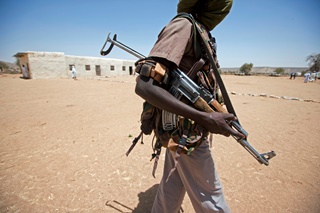ICC critical of security council’s “inaction” on Darfur
June 5, 2013 (KHARTOUM) – The International Criminal Court (ICC) has criticised the United Nations Security Council (UNSC) over its “inaction and paralysis” in response to the deteriorating situation in Sudan’s war-torn western Darfur region.

ICC prosecutor Fatou Bensouda said it was the 17th such briefing issued by her office since the 15-member UNSC referred the situation in Darfur to her office in 2005.
LACK OF CONVICTION
Bensouda singled out the lack of decisive action by the UNSC to bring to justice those allegedly responsible for the most grave human rights violations in the region as a particular point of frustration and despair.
“Regrettably, each briefing has been followed by inaction and paralysis within the council while the plight of victims of crimes committed in Darfur has gone from bad to worse”, Bensouda said.
“The deep sense of my office’s disappointment should come as no surprise to this council, given the serious concerns shared within the United Nations about the situation in Darfur”, she added.
The briefing comes following comments made by the head of UN Office for the Coordination of Humanitarian Affairs (OCHA), Valerie Amos, while on an official visit to Sudan, urging the international community not to let Darfur slip off the radar.
A recent escalation of violence in the troubled region has seen some 300,000 people displaced in the first five months of 2013 alone, more than the total number of displaced in the last two years.
The briefing notes that ongoing aerial bombardments in Darfur by the Sudanese military; the use of sexual violence as a weapon of war; government restrictions on the delivery of humanitarian aid and impunity for actors in the conflict accused of war crimes persists.
CALLS TO END IMPUNITY
Sudanese president Omer Hassan al-Bashir, defence minister Abdel Raheem Hussein and former head of the notorious “Darfur Security Desk” Ahmad Haroun have all been indicted by the ICC for war crimes and crimes against humanity allegedly committed at the height of the Darfur conflict in 2003-2004.
“We have done our part and it is up to this council to live up to the legitimate expectations of Darfur’s victims”, Bensouda said in the briefing.
“We stand ready to continue doing our part, but time is long past due for this council to act with courage and conviction by adopting appropriate measures within its mandate to ensure that Sudan fugitives are brought to justice sooner rather than later”, she added.
Bensouda also criticised the UNSC for failing to intervene after neighbouring countries, most notably Chad, refused to arrest Bashir despite him taking several trips inside their borders.
“It is a matter of great concern that this council has failed to act on any of the seven formal communications from the judges of the ICC regarding these matters”, she added.
CAUSE FOR CONCERN
Referencing a meeting that took place last month between Amos, Bashir, Hussein and Haroun, Bensouda called on the UNSC to reassess its dealings with the trio of wanted war criminal, questioning whether such contact was in the best interests of serving justice.
“I strongly encourage the UN to conduct an ongoing critical analysis of such contacts … We must ask ourselves whether the gain to the UN is worth the costs of such contact, “she said.
Bensouda noted with concern the ongoing involvement of Haroun and Hussein in alleged crimes elsewhere in Sudan.
She also pointed to reports of the ongoing involvement of ICC indictee Ali Muhammad Ali Abd-Al-Rahman, also known as Ali Kushayb, in clashes in Central Darfur in April.
Witnesses have reportedly placed Kushayb at the centre of an attack on the town of Abu Jeradil, 30kms south of Um Dukhun, on 8 April, riding in a government vehicle, together with units from the Central Reserve Police, the Border Intelligence, and other government-affiliated militia.
According to the ICC briefing, the government-aligned forces shot indiscriminately, burned homes and shops, stole livestock, and looted goods. More than 100 civilians were killed, while some 30,000 displaced people, mostly women and children, fleeing to Chad.
Bensouda urged the UNSC to engage with all relevant organisations addressing the Darfur situation, including the ICC, to assess progress in shared goals and work towards finding a comprehensive solution to the 10-year conflict.
THREAT TO SECURITY
She further warned that as long as those responsible for alleged violations in Darfur were granted impunity, they would continue to represent a threat to international peace and security.
Representatives from Luxembourg, United States, Guatemala, France, Azerbaijan, Russia, Argentina, Republic of Korea, China and Australia also spoke following the briefing.
They decried the continued violence in Darfur, and in particular, the recent assassination of Justice and Equality Movement (JEM) leaders who, in April, had signed a peace agreement with Sudan. Many delegates called for the implementation of the Doha Document for Peace in Darfur, which was described by some as the one viable avenue for establishing peace in Darfur.
Speakers also pressed Sudan to respect the ICC’s outstanding arrest warrants and called on all states to end impunity.
The representative of the United Kingdom, which holds the council’s presidency for June, said the decision of some states not to act on the warrants despite being signatories of the Rome statute was regrettable, stressing that the council should urgently consider its options for achieving peace in Darfur.
(ST)
